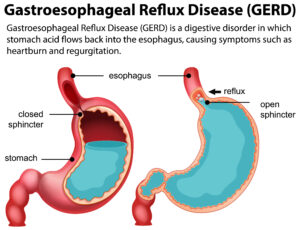
Gastroesophageal Reflux Disease, or GERD, is a chronic disease wherein stomach acid repeatedly more than once surges into the throat, delivering distress and possibly huge medical conditions. This discharge, also known as acid reflux, can irritate the covering of your throat and cause long long-term if not treated properly. How about we break it down in an understandable and available manner, so you can detect the admonition signals and make a move to get help.
What is GERD?
GERD emerges when the lower esophageal sphincter (LES) — the valve-like muscle that empowers food to enter the stomach — debilitates or relaxes at improper periods. This permits stomach acid and stomach related catalysts to pass once more into the throat. While periodic reflux is normal, GERD happens regularly, bringing about regularly, resulting in discomfort, agony, and potentially esophageal damage over time.
Signs and Symptoms of GERD
GERD can show itself in different ways, and recognizing the side effects is basic to dealing with the condition. The following are a few frequent signs:
- Indigestion: GERD is portrayed by a burning sensation in the chest, often after eating or at night.
- Regurgitation: Disgorging is the point at which a sour or bitter-tasting acid corrosives upwards into your throat or mouth.
- Difficulty Swallowing: Trouble Swallowing, also known dysphagia, can make meals uncomfortable.
- Chest Pain: Chest pain can be serious and effortlessly confused with a heart attack, so it’s critical to rule out alternative possibilities.
- Chronic cough or hoarseness: Heartburn can bother your throat and vocal chords, bringing about a chronic cough or voice alterations.
What Causes GERD?
GERD can be caused by a variety of reasons, some of which are lifestyle-related and others that are beyond our control:
- Diet: Spicy Food, coffee, alcohol, and fatty food can weaken the LES and cause reflux.
- Weight: Increased pressure on the stomach can cause acid to rise.
- Smoking: Smoking weakened the LES and increased acid output.
- Pregnancy: Hormonal changes and increased abdominal pressure can cause acid reflux.
- Hiatal Hernia: Hiatal hernia is a disorder in which a portion of the stomach pushes through the diaphragm, increasing the likelihood of reflux.
Managing GERD with Lifestyle Changes
The good news is that many cases of GERD can be managed with a few lifestyle changes. Here’s how you can take control of your symptoms:
- Eat Smaller, More Frequent Meals: Large meals might cause pressure on your stomach and LES. Try to eat in smaller portions throughout the day.
- Stay away from Trigger Food varieties: Focus on what causes your discomfort and avoid acidic, spicy, or greasy foods.
- Remain Upstanding After Meals: Lying down immediately can set off indigestion. Attempt to stand by a few hours before resting down.
- Raise the Head of Your Bed: Raising the top of your bed can help with keeping corrosive from going up the throat as you rest.
- Keep a Sound Weight: If you’re overweight, losing even a little amount will ease the burden on your stomach.
- Quit Smoking: Stopping smoking is one of the best strategies to alleviate GERD.
If you have regular indigestion (over two times per week), difficulty swallowing, or unexplained weight loss, consult with a gastroenterologist in surat. While non-prescription medications can give short comfort, constant side effects require a clinical test to stay away from long-term consequences.
